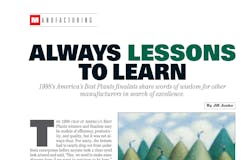I’ve been with IndustryWeek for 25 years. That so much time has gone by rather astonished me when I realized it: My silver anniversary. This awareness struck me as I sat down to write this "Parting Words" column, which was initially going to be about an entirely different topic. However, I can’t let 25 years covering the manufacturing industry go by without some reflection, and who better to share it with than you?
I didn’t have a manufacturing background when I joined IndustryWeek, except tangentially. My great uncle was somehow engaged in manufacturing, and my dad briefly worked in production for an automaker. My mom was employed for many years at a then well-known maker of plastic injecting molding machines, in the computer room. Off and on, she used to bring home dozens of plastic combs or tumblers, remnants of test runs or quality checks on equipment produced at her site. None of them ever had a conversation about manufacturing with me.
What hasn’t changed in the past 25 years is the thrill I got and get from those visits. I learn something new in every facility, and I am frequently amazed by the innovation that is a natural outgrowth of making things. What also hasn’t changed, however, is the industry’s difficulty in telling that story in a compelling way to kids and young adults—and their parents—before they settle on a career path. IndustryWeek has been writing about manufacturing’s persistent skills shortage for well over 20 years. I’ve had a hand in many of those stories.
When I joined IndustryWeek, the idea of “lean” manufacturing was in its early, heady, days, just a few years removed from such books as The Machine That Changed the World (1990) and Lean Thinking (1996). Lean manufacturing both courted controversy and had U.S. manufacturers almost giddily trying to implement it on their plant floors without really understanding it. Today the philosophies and practices that comprise lean are the bedrock of many companies’ operating systems.
I watched e-commerce become a thing and remember the early days of RFID when talk about the promise of the technology far exceeded any real-world examples of how it could help manufacturing. And web-enabled EDI in widespread use? Forget about it. Today those specific conversations are well in the rearview mirror, but the march and talk of technology continues on, more vigorously that ever.
I’ve watched the demise of manufacturing conglomerates in the past 25 years and the emergence of upstart manufacturers (although not as many upstarts as you might think). We recently announced our 2022 IndustryWeek Best Plants winners, which prompted me to look back on our winners from my first year with IW. Many of the names from the 1997 IW Best Plants class still ring familiar today—Lockheed Martin, Tenneco, Halliburton, for instance. Others have ceased to exist.
I remember bracing for the havoc Y2K would unleash on manufacturing, and I remember being completely unprepared for the havoc COVID has unleashed on manufacturing.
I’ve watched time march on in manufacturing for 25 years. I haven’t been bored, for even a minute.
Caption for top photo: A February 1999 article from IndustryWeek, one of my early feature stories for the magazine. The feature is about lessons from IndustryWeek's Best Plants Awards, a program I continues to administer.
About the Author
Jill Jusko
Bio: Jill Jusko is executive editor for IndustryWeek. She has been writing about manufacturing operations leadership for more than 20 years. Her coverage spotlights companies that are in pursuit of world-class results in quality, productivity, cost and other benchmarks by implementing the latest continuous improvement and lean/Six-Sigma strategies. Jill also coordinates IndustryWeek’s Best Plants Awards Program, which annually salutes the leading manufacturing facilities in North America.
Have a story idea? Send it to [email protected].


